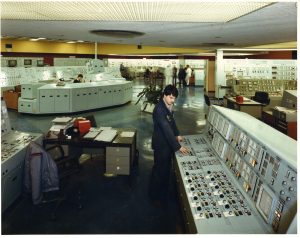A group of senior business people, policymakers and government officials visited Drax Power Station, near Selby in North Yorkshire, today (Thursday April 5) to learn more about the UK’s largest power station and its transformation to become Europe’s largest decarbonisation project.
The Whitehall & Industry Group, a charity aimed at building cooperation between government and different business sectors, which Drax is a member of, had a tour of the power station and heard about how Drax upgraded half of its generating units to use sustainable biomass instead of coal and become a predominantly renewable power generator.
Andy Koss, Drax Power CEO, who met with the delegation said:
“Using our extensive engineering skill and expertise we successfully upgraded half of the power station to use biomass, transforming the business to become the largest decarbonisation project in Europe.
“Today we produce 15% of the country’s renewable power – that’s enough for four million homes.
“We’re continuing to innovate – we plan to convert a fourth generating unit to use biomass later this year, and we’re also progressing plans for repowering the two remaining coal units with gas power generation and batteries.”
ENDS
Media contact
Ali Lewis
Drax Group Head of Media Relations
T: 01757 612165
Jessica Gorton
Drax Group Press Officer
T: 01757 612848
About Drax
Drax Group plc plays a vital role in helping change the way energy is generated, supplied and used. Its 2,300-strong staff operate across three principal areas of activity – electricity generation, electricity sales to business customers and compressed wood pellet production.
The Group includes:
Drax Power Ltd, which operates the largest power station in the UK, based at Selby, North Yorkshire and supplies 7 percent of the country’s electricity needs. The energy firm converted from burning coal to become a predominantly biomass-fuelled electricity generator. Drax is the biggest single site renewable generator in the UK and the largest decarbonisation project in Europe.
Haven Power, based in Ipswich, supplies electricity to large Industrial and Commercial sector businesses.
Opus Energy, based in Oxford, Northampton and Cardiff, provides electricity and gas to small and medium sized (SME) businesses.
Drax Biomass, is based in the US and manufactures compressed wood pellets produced from sustainably managed working forests, supplying fuel used by Drax Power Station in North Yorkshire to generate flexible, renewable power for the UK’s homes and businesses.
For more information visit www.drax.com









 Good morning everyone.
Good morning everyone.

 Most business owners are extremely time poor with a very broad range of responsibilities – all of them pressing.
Most business owners are extremely time poor with a very broad range of responsibilities – all of them pressing.


